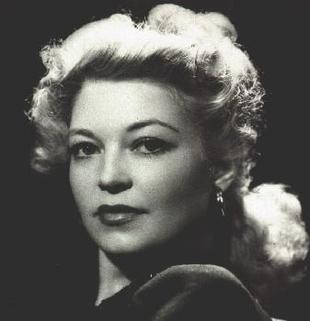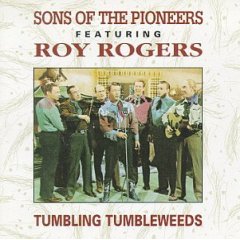
Roy Rogers was an American singer, actor, and television host. Following early work under his given name, first as co-founder of the Sons of the Pioneers and then as an actor, the rebranded Rogers then became one of the most popular Western stars of his era. Known as the "King of the Cowboys", he appeared in over 100 films and numerous radio and television episodes of The Roy Rogers Show. In many of his films and television episodes, he appeared with his wife, Dale Evans; his Golden Palomino, Trigger; and his German Shepherd, Bullet. His show was broadcast on radio for nine years and then on television from 1951 through 1957. His early roles were uncredited parts in films by fellow cowboy singing star Gene Autry and his productions usually featured a sidekick, often Pat Brady, Andy Devine, George "Gabby" Hayes, or Smiley Burnette. In his later years, he lent his name to the franchise chain of Roy Rogers Restaurants.
The Sons of the Pioneers are one of the United States' earliest Western singing groups. Known for their vocal performances, their musicianship, and their songwriting, they produced innovative recordings that have inspired many Western music performers and remained popular through the years. Since 1933, through many changes in membership, the Sons of the Pioneers have remained one of the longest-surviving country music vocal groups.
"Home on the Range" is a classic cowboy song, sometimes called the "unofficial anthem" of the American West. Dr. Brewster M. Higley of Smith County, Kansas, wrote the lyrics as the poem "My Western Home" in 1872 or 1873, with at least one source indicating it was written as early as 1871.

Cindy Walker was an American songwriter, as well as a country music singer and dancer. She wrote many popular and enduring songs recorded by many artists.
Western music is a form of country music composed by and about the people who settled and worked throughout the Western United States and Western Canada. Western music celebrates the lifestyle of the cowboy on the open ranges, Rocky Mountains, and prairies of Western North America. Directly related musically to old English, Irish, Scottish, and folk ballads, also the Mexican folk music of Northern Mexico and Southwestern United States influenced the development of this genre, particularly corrido, ranchera, New Mexico and Tejano. Western music shares similar roots with Appalachian music, which developed around the same time throughout Appalachia and the Appalachian Mountains. The music industry of the mid-20th century grouped the two genres together under the banner of country and western music, later amalgamated into the modern name, country music.
"Mule Train" is a popular song written by Johnny Lange, Hy Heath, Ramblin' Tommy Scott and Fred Glickman. It is a cowboy song, with the singer filling the role of an Old West wagon driver, spurring on his team of mules pulling a delivery wagon. As he goes about his work, the driver mentions the various mail-order goods he is delivering to far-flung customers. "Mule Train" was originally recorded by Ellis "Buz" Butler Jr. in 1947. Butler was the original writer of the song along with Fred Glickman. The original recording was released by Buz Butler on Decca Records.
"(Ghost) Riders in the Sky: A Cowboy Legend" is a cowboy-styled country/western song written in 1948 by American songwriter, film and television actor Stan Jones.
A singing cowboy was a subtype of the archetypal cowboy hero of early Western films. It references real-world campfire side ballads in the American frontier, the original cowboys sang of life on the trail with all the challenges, hardships, and dangers encountered while pushing cattle for miles up the trails and across the prairies. This continues with modern vaquero traditions and within the genre of Western music, and its related New Mexico, Red Dirt, Tejano, and Texas country music styles. A number of songs have been written and made famous by groups like the Sons of the Pioneers and Riders in the Sky and individual performers such as Gene Autry, Roy Rogers, Tex Ritter, Bob Baker and other "singing cowboys". Singing in the wrangler style, these entertainers have served to preserve the cowboy as a unique American hero.
"Don't Fence Me In" is a popular American song written in 1934, with music by Cole Porter and lyrics by Robert Fletcher and Cole Porter. Members of the Western Writers of America chose it as one of the Top 100 Western songs of all time.
This is a list of notable events in country music that took place in the year 1936.

Gunfighter Ballads and Trail Songs is the fifth studio album by Marty Robbins, released on the Columbia Records label in September 1959 and peaking at number 6 on the U.S. pop albums chart. It was recorded in a single eight-hour session on April 7, 1959, and was certified Gold by the RIAA in 1965 and Platinum in 1986. It is perhaps best known for Robbins's most successful single, "El Paso," a major hit on both the country and pop music charts, as well as for its opening track, "Big Iron," a song that gained a resurgence in popularity online as an internet meme after its inclusion in the 2010 video game Fallout: New Vegas.
"Along the Navajo Trail" is a country/pop song, written by Dick Charles, Larry Markes and Eddie DeLange in 1945, and first recorded by Dinah Shore in May 1945.
"Git Along, Little Dogies" is a traditional cowboy ballad, also performed under the title "Whoopie Ti Yi Yo." It is cataloged as Roud Folk Song Index No. 827. Members of the Western Writers of America chose it as one of the Top 100 Western songs of all time.
"San Antonio Rose" is a swing instrumental introduced in late 1938 by Bob Wills and His Texas Playboys. Quickly becoming the band's most popular number, Wills and band members devised lyrics, which were recorded on April 16, 1940, and released on Okeh 5694 in August as "New San Antonio Rose". Despite having completed a lengthy Hillbilly/Folk chart run in 1939, which culminated at #1, it quickly rose to the top again, in early 1941. It went on to become the band's theme song for the next forty years, reverting to its original title.
Rhythm on the Range is a 1936 American Western musical film directed by Norman Taurog and starring Bing Crosby, Frances Farmer, and Bob Burns. Based on a story by Mervin J. Houser, the film is about a cowboy who meets a beautiful young woman while returning from a rodeo in the east, and invites her to stay at his California ranch to experience his simple, honest way of life. Rhythm on the Range was Crosby's only Western film and introduced two western songs, "Empty Saddles" by Billy Hill and "I'm an Old Cowhand " by Johnny Mercer, the latter becoming a national hit song for Crosby. The film played a role in familiarizing its audience with the singing cowboy and Western music on a national level.

"I'm an Old Cowhand (From the Rio Grande)" is a comic song written by Johnny Mercer for the Paramount Pictures release Rhythm on the Range and sung by its star, Bing Crosby. The Crosby commercial recording was made on July 17, 1936, with Jimmy Dorsey & his Orchestra for Decca Records. It was a huge hit in 1936, reaching the No. 2 spot in the charts of the day, and it greatly furthered Mercer's career. Crosby recorded the song again in 1954 for his album Bing: A Musical Autobiography.
Members of the Western Writers of America chose it as one of the Top 100 Western songs of all time.

"Tumbling Tumbleweeds" is a Western music song composed by Bob Nolan, a founding member of the Sons of the Pioneers. Nolan wrote the song in the early 1930s while he was working as a caddy and living in Los Angeles. It was first recorded by the Sons of the Pioneers in 1934, and it became one of the most famous songs associated with the group. Originally titled "Tumbling Leaves", the song was reworked into the title "Tumbling Tumbleweeds" and into more widespread fame with the 1935 film of the same name starring Gene Autry. Members of the Western Writers of America chose it as one of the Top 100 Western songs of all time.
"The Cattle Call" is a song written and recorded in 1934 by American songwriter and musician Tex Owens. The melody was adapted from Bruno Rudzinksi's 1928 recording "Pawel Walc". It later became a signature song for Eddy Arnold. Members of the Western Writers of America chose it as one of the Top 100 Western songs of all time.
For music from an individual year in the 1940s, go to 40 | 41 | 42 | 43 | 44 | 45 | 46 | 47 | 48 | 49

Cowboy Songs is a compilation album of phonograph records by Bing Crosby released in 1939 featuring Western songs.






